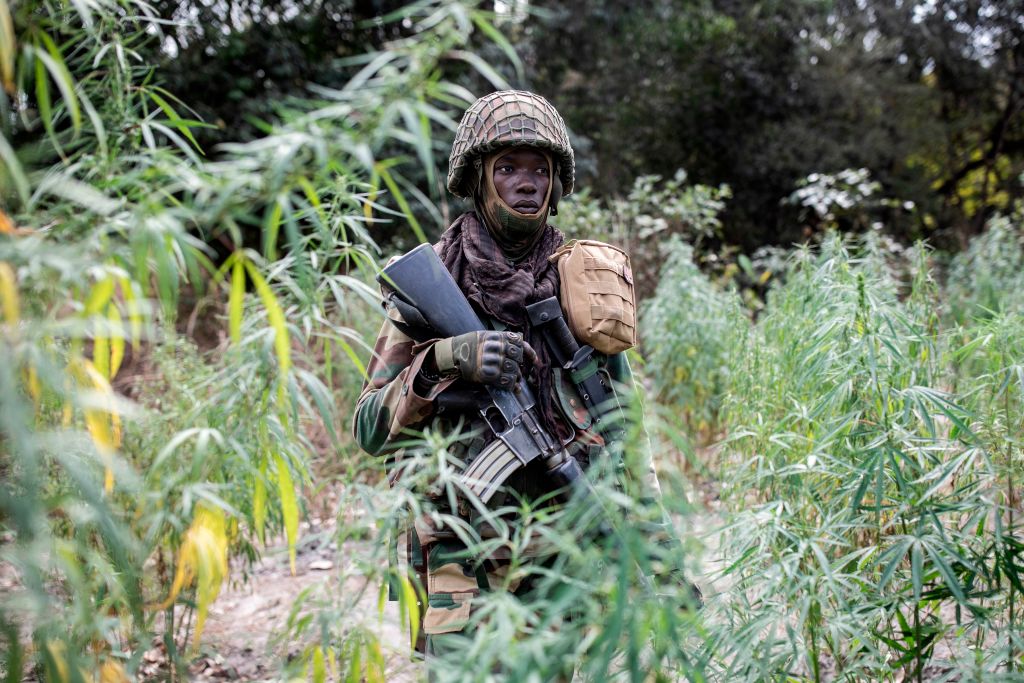The war-weary people of Casamance are desperate for peace, but timber and cannabis trafficking continue to fuel conflict.
An agreement signed in August 2022 between a factional leader of the Movement of Democratic Forces of Casamance (MFDC) and Senegal brought some hope that the 40-year conflict might be nearing an end. Neighboring Guinea-Bissau mediated the agreement.
But observers immediately questioned whether the agreement could hold since it was signed by the leader of only one MFDC faction, while others were not involved.
“To my knowledge, this is neither a peace agreement nor even a cease-fire,” Jean-Claude Marut, an expert on the conflict, told Radio France Internationale in August 2022. “It looks more like a surrender of one of the main components of the rebellion. … I think we need to put in perspective the importance of the event.”
The fragility of the accord came into focus on January 16 when a clash with rebels left one Senegalese Soldier dead and seven others injured. Senegalese forces were conducting an operation to prevent the MFDC from setting up a base near the Gambian border and were destroying hemp fields that the rebels use as a revenue source.
“The groups that have been dispersed, have not disappeared,” Marut said. He added that small groups continue to pillage, but their military capacity is greatly diminished.
Over the past year, some of the estimated 60,000 displaced people began to return to the Casamance region, which is geographically and culturally distinct from the rest of Senegal. Returnees have found an atmosphere often described as “neither war nor peace.” The conditions are worsened by land mines left over from decades of conflict.
“I had just returned to the village after some years spent abroad because of the war,” Charles Ndeeky, a man who lost a leg to a land mine blast, told DW.com. “At that time, authorities told us that the area was safe. But they were wrong.”
The Senegalese National Mine Action Center says 49 to 170 hectares of land, predominantly in the Ziguinchor region, are mined. The center has documented 453 civilian injuries and 157 deaths from mines since the beginning of the conflict, Al-Jazeera reported.
Another impediment to peace is illegal trafficking. The region is home to rosewood trees, which are prized by furniture makers in China for their unique red hue. Senegal has lost more than 1 million trees since 2010, according to the Environmental Investigation Agency.
“Trees are cut secretly at night or in broad daylight showing fake permits,” Fossar Dabo, a physics teacher and activist, told DW.com. “Then the wood is moved just across the Gambian border from where it is exported to China.”
Rosewood was declared virtually extinct in The Gambia, but the country continues to export large amounts of it to China. The wood is harvested and trafficked from Senegalese forests in an illicit economy that funds rebel groups.
“Every month we come across dozens of trees destroyed. In this way our land risks deforestation and desertification,” said Dabo, who founded a group called Green Sedhiou to protest timber smuggling. “As Casamancese, we cannot lose this priceless wealth.”
The Armed Forces of Senegal have made it a priority to stop drug and timber trafficking and retake rebel-occupied territory. During a massive effort launched in March 2022 known as Operation North Bignona, the military assembled ground, air and logistical elements as it systematically cleared the area bordering The Gambia. The operation resulted in the destruction of 18 rebel bases, 140 tons of hemp and the capture of numerous weapons caches, stolen vehicles and the arrest of traffickers.
A previous offensive launched in 2021 had cleared rebels from areas south of the Casamance River, near the border with Guinea-Bissau.
During a May 2022 visit to troops in the Ziguinchor region Senegalese Chief of Army Staff Gen. Cheikh Wade voiced determination to finish the fight.
“The MFDC is doomed to a death that may be slow, but is certain,” Wade said. “And the process is irreversible.”
Analysts say the rebel group is greatly weakened by the military offensives but warn it could regroup in a new stronghold. One possibility is the vast Niokolo Koba National Park in the east of the country where illicit gold mining and poaching could offer new revenue sources.
“Will the decisive military offensives and weakening of traditional fallback areas in Guinea-Bissau and Gambia, mark the beginning of the end for the MFDC?” wrote the Global Initiative Against Transnational Organized Crime in an October 2022 Risk Bulletin. “Or will the rebels merely displace geographically, searching for alternative sources of funding?”

